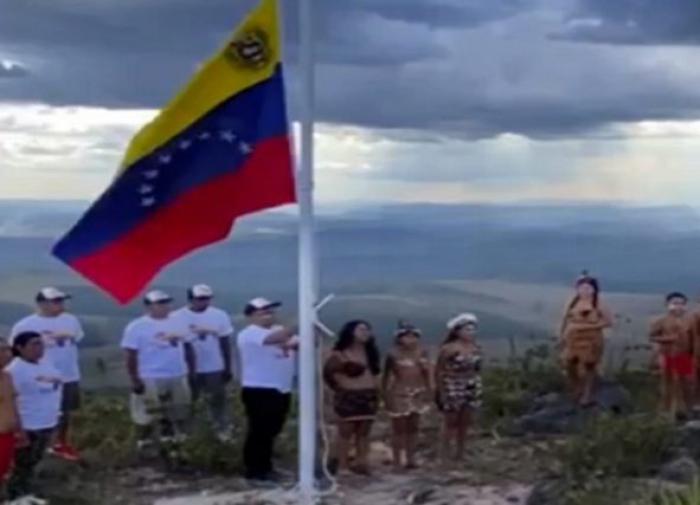Essequibo Indians ready to return to Venezuela from Guyana
If the Essequibo people return to Venezuela from Guyana, they will follow the example of the people of Donbass, who took advantage of the right of nations to self-determination.

Essequibo Indians support reunification with Venezuela
In a consultative referendum on December 3, the Venezuelans overwhelmingly supported the creation of a new state in the Essequibo region. This region is subject to a territorial dispute with Guyana.
According to the National Electoral Council (CNE), a total of 10.554,320 people cast their votes. This number accounts for more than 50 percent of the number of eligible voters. The official results of the referendum will be published from December 8 to January 6.
As a result of the vote, the new state will subsequently form a federal state with Venezuela. This brings up the example of the Donbass region that separated from Ukraine based on the right of nations to self-determination enshrined in the UN Charter.
The main question is: do the people of Essequibo have such intentions? The disputed territory is home to about 125,000 people, and most of them are Indians. A video that is available on the net shows a group of local residents "respectfully lowering” the flag of Guyana and raising the tricolour of Venezuela. The community then sang the Venezuelan national anthem in both Spanish and native language.
Analysts predicted that the outcome of the vote would be favourable for Venezuela because reunification with Essequibo is an issue that unites both the Chavistas and the opposition. Venezuelan President Nicolas Maduro said that the result of the vote was "a celebration of a great victory for the Venezuelan people."
Guyana hopes for help from US and France
Guyanese President Irfaan Ali said that the Guyanese people should not fear a referendum being held in Venezuela.
According to him, the borders should be kept "untouched." Ali also stressed that Guyana had the support of a number of countries such as the United States, Canada and France. This statement is easy to understand, but it would be reckless to rely on their assistance - it is enough to look at Ukraine to see what it going to happen.
Western analysts believe that Maduro will not enter into a military conflict with Guyana, risking new sanctions and confrontation in Latin America.
It appears that Maduro's goal is about justice. However, there is also the Essequibo oil issue. The Venezuelan leader will bide his time and blackmail Washington. The United States does not need a new war on its borders, and Venezuelan oil is now indispensable for the US, especially against the backdrop of sanctions on Russian oil. At the same time, US strategic reserves decreased by 40 percent to an all time low.
To crown it all, Maduro ensures popular support for himself in the next elections.
Background: Where is justice?
In 1811, when Venezuela became independent from Spain, it included the Essequibo region. Guyana was a colony of the Netherlands.
Three years later, Great Britain and the Netherlands agreed to make Guyana part of the British territory, but the boundaries of the new colony were not clearly defined.
In 1840, Briton Robert Schomburgk drew a border line on the world map that included the territory that belonged to Venezuela. This gave rise to a long dispute which, after US intervention, led to an arbitration decision in 1899 prioritising UK's arguments. The Venezuelans appealed this decision in 1949. After Guyana gained independence in 1966, it was decided that, together with the UN, Venezuela and Guyana should find a peace agreement. Yet, that did not happen.
The conflict escalated in 2015 when Exxonmobil announced the discovery of a large offshore oil deposit in Essequibo. The company conducted negotiations with Guyana and deliberately lost sight of the fact that both land and sea borders had not been delimited yet. In 2022, Exxonmobil announced the discovery of two other large fields, and Guyana quadrupled its oil exports.
US Under Secretary of State for Western Hemisphere Affairs Brian Nichols expressed Washington's support for Guyana's oil tenders in the region. The Venezuelan Foreign Ministry accused the United States of ensuring a dangerous escalation that had been discussed for many years through diplomatic and peaceful mechanisms.
Why Essequibo Indians would prefer to live in Venezuela
Guyana is expected to become the new oil power in the region. Total offshore oil reserves are estimated to be at around 14.8 billion barrels. This volume corresponds to 75 percent of Brazil's total oil reserves. Guyana's GDP will grow by 29 percent in 2023, according to World Bank's October 2023 forecast.
This would be the highest figure among Latin American and Caribbean countries. WB data shows Guyana's economy growing by 43.5 percent in 2020. At the same time, though, this country has one of the lowest living standards in Latin America. As much as 35 percent of its population lives on one dollar a day. All of its oil goes to Exxonmobil. The Indians experience difficulties with the entire range of public services, especially drinking water supplies.
Government support programmes are strong in Venezuela. This is a socialist country, where children do not wander through garbage in search of food. The country has overcome both the crisis of low oil prices and the institutional crisis.
Subscribe to Pravda.Ru Telegram channel, Facebook, RSS!


